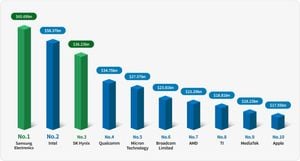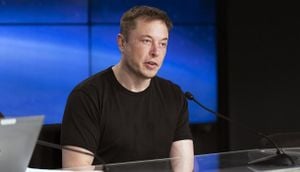On the third anniversary of Russia's invasion of Ukraine, the United Kingdom's Foreign Secretary, David Lammy, announced today the introduction of what he termed the "largest sanctions package" aimed at crippling Russia's military capabilities. This decision marks a significant escalation as European nations re-evaluate their strategies against Kremlin aggression.
Lammy, who characterized this move as part of the United Kingdom's commitment to support Ukraine, declared, "It is time to tighten the screws on Putin's Russia," affirming plans to diminish the flow of resources fueling the war. The UK has been one of Ukraine's staunchest allies, providing substantial military aid amounting to approximately £3 billion annually.
During his remarks, Lammy emphasized the importance of Europe rallying behind Ukraine, stating, "This is a pivotal moment in history for Ukraine, the UK, and all of Europe," and underscoring the need for cohesion among Western powers.
Simultaneously, Italy's Prime Minister Giorgia Meloni, speaking at the Conservative Political Action Conference (CPAC) held in Washington, echoed these sentiments, reinforcing the necessity of unity between the US and Europe for achieving lasting peace. Meloni highlighted the struggle of the Ukrainian people, who have become symbols of resistance against oppression, stating, "A proud nation fights for its freedom against brutal aggression." She also warned against the divisive forces of radical leftism threatening Western unity.
While the UK and Italy appear resolute, negotiations between the US and Ukraine over mineral extraction hold significant weight as the conflict evolves. Reports indicate the US is demanding Ukraine sign off on an agreement involving its rare earth minerals, with President Donald Trump publicly stating, "Sign the rare earth deal, or give us our money back." These negotiations have raised concerns about sovereignty as Ukraine has expressed reluctance to conform to what they perceive as detrimental agreements.
Adding complexity, as negotiations stalled, the US has allegedly threatened to restrict Ukraine's access to the Starlink internet satellite system, which has been pivotal for Ukraine's military communications. Such actions have portrayed stark leverage dynamics, reminiscent of high-stakes geopolitics reminiscent of past debts and military funding arrangements.
On the ground, the situation remains dire. Just yesterday, air alerts rang through Kyiv as Russian drones targeted the city, leading to civilian casualties and the destruction of infrastructure. The relentless bombardment took the life of one person and injured several others.
While Ukrainian President Volodymyr Zelensky prepares for negotiations with Trump over these mineral deals, he continues to express concern over the overarching military assistance provided during the war's course. Amid increasing military actions, Nocolas Bessent, US Secretary of Treasury, reinforced the commitment to ensuring the funds are allocated efficiently to bolster Ukrainian defenses.
Diplomatic channels remain fraught with tension, and as Trump positions himself to negotiate with Ukraine for resource concessions, the status of current agreements looms large. The negotiations, marked by the threatening backdrop of military activity and humanitarian crises, serve as both catalyst and foil to the broader resolution efforts between Western leaders proposing paths toward peace.
On the diplomatic front, Ukraine unyieldingly advocates for its rightful sovereignty, refusing to waver under pressure exerted by external forces. This was evident in recent diplomatic discourses where Zelensky stood firm against proposals perceived as attempts to undermine national control.
Contrasting the dynamics between US and UK positions with Italy's resolute stance exhibits the disparate levels of commitment to Ukraine's autonomy. Mixed reactions within the international community have surfaced, with factions urging for more stringent action against aggressor states.
Emphasis remains on finding pathways for constructive dialogue. Prime Minister Meloni stated unequivocally, "The West cannot exist without America and Europe," urging fellow nations not to succumb to isolationist tactics but instead collaborate closely to maintain their liberties.
Meanwhile, the situation remains fluid. The European Union is contemplating the possibility of confiscated Russian assets serving to finance reparations to Ukraine, reflecting the strategic pivot policymakers are undertaking as they contend with Russia's aggression.
Analysts speculate with cautious optimism following Trump's remarks about peace talks as key figures within his administration continue to relay commitments of military support, emphasizing the need for sustained backing.
Three years since the onset of conflict, the international community finds itself grappling not only with military dynamics but also with the urgent necessity of promoting humanitarian benefits and ensuring regional stability. With both support and sanctioning poised as dual mechanisms, the coming days and weeks are anticipated to bring pivotal developments on multiple fronts.
Understanding the heartbreaking narratives of those caught amid the conflict's turbulence is equally pressing as the geopolitical chessboard shifts. Amid negotiations and military posturing, ordinary Ukrainians endure trials few will ever truly comprehend.
Can unity prevail? Will the West overcome its past missteps to fortify Ukraine against the continued threats? Only time will tell as this long-standing conflict rages on, pressing leaders to navigate the challenges simultaneously battling both diplomacy and devastation.
Both sides—one seeking leverage through minerals, the other determined to defend sovereignty—point toward the necessity of cooperation over confrontation. The challenge remains for all parties involved to rise above historical animosities and prejudices toward achieving enduring peace for Ukraine.



